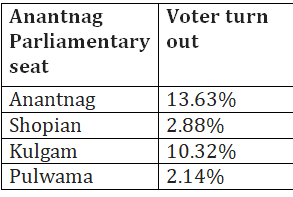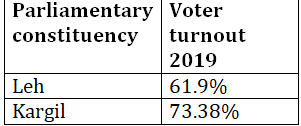Amidst calls for boycott, sporadic incidents of violence and massive security arrangements, the Lok Sabha elections in Jammu and Kashmir concluded on May 6. While voters in Jammu and Ladakh thronged to the polling stations, Kashmir valley saw one of the worst turnouts in the recent decades.
The elections in Jammu and Kashmir had hogged the headlines when Election Commission felt that the environment was conducive to hold Parliamentary elections but not assembly polls, owing to the security situation in the Valley. While the regional political parties – Peoples Democratic Party (PDP), National Conference (NC), Peoples Conference (PC) and others – had vociferously criticised this decision, Bharatiya Janata Party (BJP) had welcomed it.
After the failure of the BJP-PDP government, the state was under Governor’s rule, and later, has been under President’s rule. Nonetheless, parliamentary elections were held against the backdrop of the volatile situation in the Valley, particularly in South Kashmir, and intensified crackdown on separatists and other socio-political organisations.
While the state saw an overall voter turnout of 44.51%, as compared to 49.52% in 2014, majority of that percentage came from Jammu and Ladakh regions of the restive state. There are 22 districts in the state of Jammu and Kashmir – 10 in each Jammu division and Kashmir division and two from Kargil and Leh in Ladakh region.
Kashmir
Voter turnout in Jammu and Kashmir (J&K) saw a dip as most of the polling stations remained deserted. After 2002, this year’s voter turnout was the lowest in the Valley. Take a look at the decline in percentage:

The Anantnag parliamentary seat went to polls in three phases, covering four volatile districts – Anantnag, Kulgam, Shopian and Pulwama. The elections in South Kashmir witnessed at least two incidents of grenade attacks at the polling stations.

Political commentators believe that the recent developments and boycott calls by the separatist groups and militant groups were responsible for the low turnout. However, this kind of a response to the elections is not unprecedented in Kashmir.
In the last four years, resentment among the locals has been elevated. Article 35A, which confers certain rights to the permanent residents of the state, is facing a challenge in the Supreme Court. Political commentators attribute the low voter turnout also to the BJP’s muscular approach in dealing with the situation in Kashmir.
Jammu
In Jammu, the situation was completely opposite. Not only did the voting percentage grew in Jammu parliamentary constituency, the region saw a fierce contest between ruling BJP and Congress. The road for the one-on-one contest was paved by the decision of the regional parties like National Conference and Peoples Democratic Party not to field candidates from the two parliamentary seats of Jammu.
While BJP aims at retaining both the seats this election, the voters may not be happy with its work in the past five years.

However, Udhampur parliamentary seat saw a slight dip in the voter turnout. The slight dip can be attributed to the two districts – Kishtwar and Chenab valley. Recently, in an episode of violence in Kishtwar, a Rashtriya Swayamsevak Sangh (RSS) worker was killed. On the other hand, experts speak of disenchantment of the voters in Doda and Chenab valley district.

Ladakh
The twin districts of Ladakh parliamentary seat – Leh and Kargil—witnessed a voter turnout of 63.07%. Kargil district saw massive participation of the voters. As reported earlier by NewsClick, majority of the residents of Kargil had boycotted regional political parties, and were willing to vote for an independent candidate. The elections for Ladakh parliamentary seat were mired in controversy, as the BJP state president was accused of trying to bribe Leh journalists to influence the voters.
This time, Ladakh saw one-on-one contest between independent candidates and political parties, mainly BJP. PDP and NC openly supported Sajjad Hussain, a former journalist, who was contesting as an independent candidate from Kargil.





